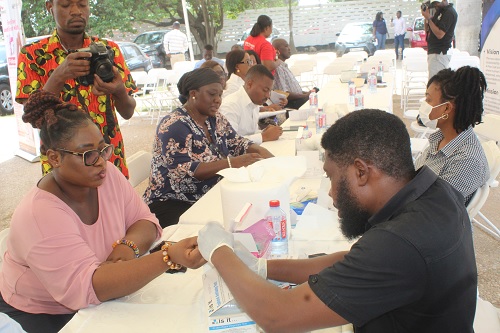
CHRAJ deploys 300 election observers
The Commissioner on Human Rights and Administrative Justice (CHRAJ), Dr Joseph Whittal, has deployed 300 observers nationwide to monitor this year’s elections on December 7.
The observers will be stationed at the various polling stations where the commission has offices to monitor various issues bordering on the right to vote.
The issues include intemperate language use on the airwaves, violence, provisions made for vulnerable persons (pregnant women, aged, persons with disability) to vote early, and unreasonable use of force by security agencies on voters, among others.
Dr Whittal, who announced this to journalists after a health screening exercise at the commission’s head office in Accra yesterday, said following the observation, a special report with recommendations would be presented to Parliament.
The health screening was in partnership with Tobinco Pharmaceuticals.
Special Voting
Dr Whittal explained that while the commission had in previous years not added the Special Voting exercise to the observation, the commission might review its position on it in light of a viral video in which some security officers were seen receiving food while in a queue to vote.

“When I looked at the video, it was more of an embarrassment because security officers must be security conscious.
“How can you come to exercise your franchise and somebody gives you food, which you don't even know where the food is coming from, and you take it and you're happy that it's okay to take it, particularly when you are being allowed to exercise that franchise to go and secure the environment on the server for all Ghanaians, and you started it on a false note?” he said.
“What happens if you go to the field and other people come to give food to people in a queue? Are you sure you will be able to cause any arrest because you don't see it as a problem?” he questioned, describing the incident as corruption and an integrity breach.
PWD Day
In his remarks on the commemoration of the International Day of Persons with Disabilities (PWD), Dr Whittal said while the government had put in place regulations and policies to promote the rights of PWDs, government and the relevant institutions needed to do more to ensure the protection of the rights of PWDs and Ghana's compliance with the dictates of the 1992 Constitution, the African Charter on Human and People's Rights and the UN Convention on the Rights of People with Disabilities (CRPD).
He added that the PWD Act 2006 (Act 715) passed before Ghana's ratification of the United Nations Convention on Persons with Disability (UN CRPD) was out of step with Ghana's CRPD obligations as it related to women, children, right to information, and the conditions of persons with disabilities in disaster situations, as well as political participation.
The commission, therefore, encouraged the government to expedite the review and amendment of the Persons with Disabilities Act 2006 (Act 715) to conform to the UN CRPD, and also fast-track the ratification of the Protocol to the African Charter on Human and Peoples' Rights on the Rights of Persons with Disabilities and the Optional Protocol to the Convention on the Rights of Persons with Disabilities.
“The government, through the Mental Health Authority, is entreated to adequately resource visiting Committees and Tribunals across all the regions of Ghana to ensure the effective monitoring of psychiatric hospitals and prayer/traditional healing centres to ensure the respect of the rights of mentally ill individuals,” he said.
